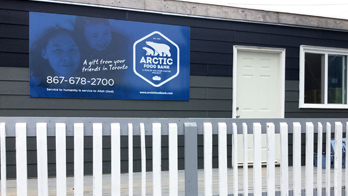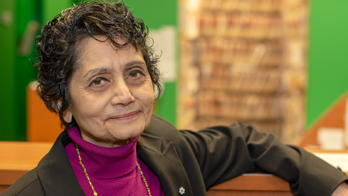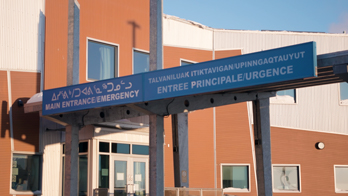From refugee to lifesaving pilot, Nour Utayim has delivered food and essential medical supplies to remote northern communities, including during the early days of COVID-19 and captains medical evacuation flights.
#ImmigrationMatters in Montréal, Quebec, and Kuujjuaq, Nunavik – Flying to the rescue in Nunavik
Flying to the rescue in Nunavik
November 17, 2023
Share:

Growing up in Syria, Nour Utayim dreamed of being a pilot like her father and grandfather. But war has a habit of getting in the way of dreams and so she made plans to study engineering instead.
But fate had a twist in store. After she arrived in Canada in 2017 and settled into the Montréal suburb of Saint-Bruno, she discovered she was living just a few minutes from a flight school. By 2019, at age 24, she was not only a licensed pilot but a flight instructor.
She joined Air Inuit as a first officer in late 2021. Along with offering passenger flights in Nunavik, Nunavut and southern Quebec, the airline runs medical evacuation flights and delivers food and essential goods, including medical supplies, to fly-in communities. Some of Nour’s earliest flights saw her flying cargo planes.
There’s this really rewarding feeling at the end of the medevac when we deliver the patient to the ambulance and they close the door and start driving away. It feels like ‘mission accomplished’—and not just any mission, but a humanitarian mission.
Nour Utayim, Air Inuit pilot
But she soon found herself called upon to deliver critically ill patients to emergency rooms on medevac flights aboard the King Air 350—a small plane that can be configured to seat 11 passengers, transport cargo or serve as an air ambulance. Masked and dressed in protective gear to minimize the risk of exposure to COVID-19, she was never sure what condition the patient was in or exactly what the problem might be. All she knew was that if the destination was Montréal (rather than a larger nearby town), it was serious.
“It’s hard when you get a call at 2 a.m. for a medevac flight,” says Nour. “But you want to help. You know somebody with a medical crisis is waiting for you to prepare the plane and fly.”
Earlier this year, she was promoted from first officer to captain on the King Air. She copes with challenging flying conditions on some of these flights. High winds, heavy snow and blizzards in the north can complicate things, especially on the smaller planes used for medevacs, which are harder to control during turbulence and trickier to land during crosswinds.
The remote communities served by Air Inuit are lucky to have Nour: the airline has an ongoing pilot shortage. Worldwide, only 5% of commercial pilots are women, and fewer than 1.5% are captainsFootnote*:

Melissa Haney, Air Inuit’s first female Inuk captain, has known Nour since 2019 and describes her as a great role model. “She is showing the young Inuit of Nunavik that you can accomplish anything.”
Nour has a brisk, serious energy about her, suggesting that despite her achievements, she’s just getting started. Her flight school instructor, Jaime Andrés Arango Restrepo, noticed it right away.
“I knew Nour would succeed as soon as I met her,” he says. “She has the type of personality that drives aviators—going beyond what’s expected.”
He also believes she’s opening some eyes. “As a young female pilot who was once a Syrian refugee, she’s challenging people’s biases and broadening horizons.”
Nour quickly integrated into her community, mastering French after settling in Quebec, and is now fluently trilingual, speaking English and Arabic as well. In fact, she says she and her family enjoy living in Saint-Bruno because they’re immersed in Francophone culture. “It allows us to speak more French,” she says.
The part of her job she likes best is serving remote Canadian communities. “It really feels like we’re helping to make a difference,” she says.
She isn’t sure what the future may hold, but she’s in no rush to figure it out: the winter conditions where she flies are sharpening her piloting skills, and she’s enjoying every moment.
Immigration profile: Montréal and Nunavik, Quebec
Quick facts:
- Immigrants make up 24.3% of Montréal’s population.
- Montréal has the highest percentage of people of Syrian origin (40%) in Canada.
- Among recent permanent immigrants in Quebec, 75.8% could speak French in 2021.
- According to the 2021 census, more than 3.1 million households in Canada (21.0%) were multilingual, meaning that at least 2 languages were spoken in those households.
- Nunavik is the northernmost region of Quebec, with a total population of 14,050, as per the 2021 census.
- Women represent 7% of pilots in Canada.
Did you know?
- Canada’s aviation and aerospace industry is made up of 26% skilled immigrants. Read more about how immigrants are making important contributions across every sector of Canada’s economy.
You may also be interested in ...
 Tackling food insecurity in Canada’s North
Tackling food insecurity in Canada’s North
The Arctic Food Bank—founded by the Muslim Welfare Centre and staffed by immigrant and Indigenous volunteers—has served hundreds of Inuvik residents since 2015.
 “Angel of the North” delivering her third generation of babies
“Angel of the North” delivering her third generation of babies
Dr. Lalita Malhotra, originally from India, has delivered more than 10,000 babies in Canada. She has established such deep connections with the local Indigenous community over the years that it has named her their “Angel of the North”.
 Promoting patient care in Iqaluit
Promoting patient care in Iqaluit
Mistaking Baffin Island for Banff brought a qualified nurse to promote continuity of care in Canada’s northern communities.




